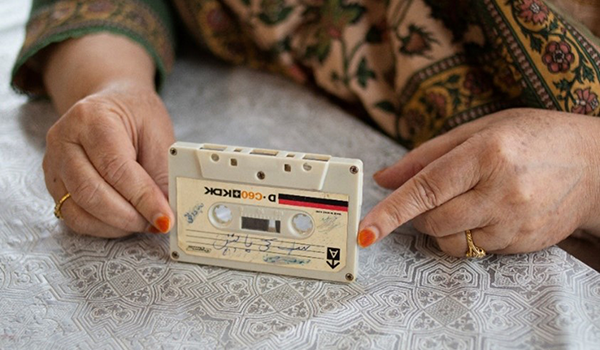
New exhibitions from Tape Letters Scotland showcase unorthodox long-distance communication method in Scottish-Pakistani communities from 1960-80
Tape Letters Scotland, has launch a series of new audio-visual exhibitions in Edinburgh, Glasgow and at Dundee Central Library, shining a light on the use of audio cassette as a mode of long-distance communication by the Pakistani diaspora in Scotland between 1960–1980. Drawing directly from both first-hand interviews carried out by the project team and the informal, intimate conversations recorded on cassettes themselves, the exhibitions showcase the experiences of members of Scotland’s Pakistani communities, exploring the topics of migration, identity, communication and language.
A pre-cursor to the modern-day voice-note, sending physical audio cassette recordings became popular amongst British-Pakistani communities in the 1960s, as a means of communicating with friends and relatives in Pakistan. The format offered a cheaper alternative to international telephone calls, whilst also providing a more accessible option for those unable to read or write letters. However, the practice has since remained largely unknown to many, even within British-Pakistani communities, with many original tapes lost or later recorded over.
First launched in 2018, Tape Letters is a pioneering project by Modus Arts, which aims to unearth, archive, and represent a portrait of this method of communication for communities during this period. A time when the telephone was communal, the tapes left room for intimacy in messages to loved ones. The exhibition also highlights the prominence of liberated female voices. It enabled the speaker to convey humour or capture disbelief, sing songs or speak poems aloud. Glasgow resident Assia Ali held these ‘prized possessions’ close as did Izaz Ur Rahman from Edinburgh who treasured the immediacy of this form of communication as it felt like his family were there in the room with him. Jamila Bibi exclaimed she had a reply from her parents in as little as a week in some cases.
The project began with Modus Arts Director, Wajid Yaseen, discovering his own family’s history of sending personalised cassette tapes to relatives. It uncovered a wide-spread history of the practice across British-Pakistani families in England and more recently Scotland. This Autumn, the Scotland-wide edition of the project, Tape Letters Scotland, which launched in 2022 and is funded by The National Lottery Heritage Fund, is hosting a series of three exhibitions at the Museum of Edinburgh, Tramway, Glasgow, and Dundee Central Library. The cumulation of 2 years of work, the exhibitions will showcase the stories and experiences from 20 cassette tapes, and 80 oral histories, gathered from individuals and families living across Scotland’s central belt.
The National Library of Scotland has hosted a special public talk featuring Wajid Yaseen and Tape Letters Scotland Project Coordinator, Syma Ahmed, where audiences were invited to hear first-hand from the project team about their work, and the importance of archiving and preserving migrant stories for present and future generations. Serving to both broaden access to the project, and preserve these unique historical accounts, Tape Letters Scotland is set to launch a WebXR-based digital exhibition and specialised App, followed by a Podcast series later this year.
Wajid Yaseen, Director of Modus Arts, said: “The Tape Letters project has turned out to be far more fruitful than I could have envisaged, and analysing the archive has felt akin to undertaking a sort of 'sonic archaeology' – a deep dive into a wide range of fields and themes, including memory studies, linguistics, migration, discrimination, communication technologies, class and socio-economic dynamics, and many others. Although it has become a surprisingly complex social history project, it primarily demonstrates the deep and inherent need for people to communicate with each other in whatever way they can, wherever they're originally from or wherever they find themselves in the world.”
Faria Khan, from Glasgow, who contributed to the archive, said: “Dad used to turn the cassette player on and test it and, you know, he’d bang on the mic saying “testing, testing”. It was just such an exciting thing preparing to record something! Like, what are we doing here? He’d then explain to us that it was a message for the family back home in Pakistan.”
Aqsa Mohammed, from Glasgow, also part of the exhibition, said: “My mum would listen to the tapes and tears would fall – she was always crying. Even when recording she would be crying. I’d get excited though. “Haan tape aayi!” [Alright! a tape has arrived!] It felt like a different feeling for us – a very emotional time. Emotional for her. Excitement for us.”
Image Credit: Miriam Ali
